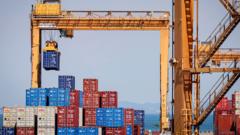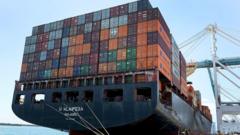DHL Express has announced a temporary suspension of deliveries to the US for items valued over $800 due to heightened customs regulations that have come into effect following the new tariff regime introduced by the Trump administration.
DHL Halts High-Value US Deliveries Amid Trump's Tariff Changes

DHL Halts High-Value US Deliveries Amid Trump's Tariff Changes
DHL Express pauses $800+ deliveries to the US, citing increased customs hurdles from recent tariffs.
DHL Express has officially confirmed that, effective immediately, it will stop shipping packages exceeding $800 to the United States. This decision stems from a "significant increase" in customs paperwork triggered by recent tariff policies implemented by former President Donald Trump. Previously, shipments valued up to $2,500 enjoyed expedited customs processing, but increased scrutiny has now lowered that threshold.
The suspension, which applies to all countries sending products to American consumers, will remain until further notice. However, DHL will continue to facilitate business-to-business shipments, which may also encounter delays due to the backlog created by these regulatory changes. The company stressed that they are working extensively to manage the uptick in customs clearances, stating that shipments over $800 may face delays extending into several days.
Notably, packages valued below $800 can still be sent with minimal checks. However, this status is set to change on May 2, when the Biden administration will tighten regulations further regarding low-value packages, particularly those originating from China and Hong Kong. The planned repeal of the "de minimis" rule will obligate these shipments to incur duties, potentially affecting retailers like Shein and Temu who are known for their affordable pricing structures.
In conjunction with these tariff modifications, the Trump administration has expressed concerns about illegal substances being concealed within shipments from certain countries, particularly China. As part of the measures intended to combat the opioid crisis in the US, the White House has targeted shipments it considers a risk for evading customs scrutiny.
Amid the chaos created by these trade policies, Hongkong Post has already announced it will halt shipments destined for the US by sea, condemning American tariff practices as abusive. The implications of these tariffs and regulatory changes may lead to increased prices for consumers in the US, particularly for everyday items, as companies prepare for the financial burden imposed by the new customs rules.
The suspension, which applies to all countries sending products to American consumers, will remain until further notice. However, DHL will continue to facilitate business-to-business shipments, which may also encounter delays due to the backlog created by these regulatory changes. The company stressed that they are working extensively to manage the uptick in customs clearances, stating that shipments over $800 may face delays extending into several days.
Notably, packages valued below $800 can still be sent with minimal checks. However, this status is set to change on May 2, when the Biden administration will tighten regulations further regarding low-value packages, particularly those originating from China and Hong Kong. The planned repeal of the "de minimis" rule will obligate these shipments to incur duties, potentially affecting retailers like Shein and Temu who are known for their affordable pricing structures.
In conjunction with these tariff modifications, the Trump administration has expressed concerns about illegal substances being concealed within shipments from certain countries, particularly China. As part of the measures intended to combat the opioid crisis in the US, the White House has targeted shipments it considers a risk for evading customs scrutiny.
Amid the chaos created by these trade policies, Hongkong Post has already announced it will halt shipments destined for the US by sea, condemning American tariff practices as abusive. The implications of these tariffs and regulatory changes may lead to increased prices for consumers in the US, particularly for everyday items, as companies prepare for the financial burden imposed by the new customs rules.



















